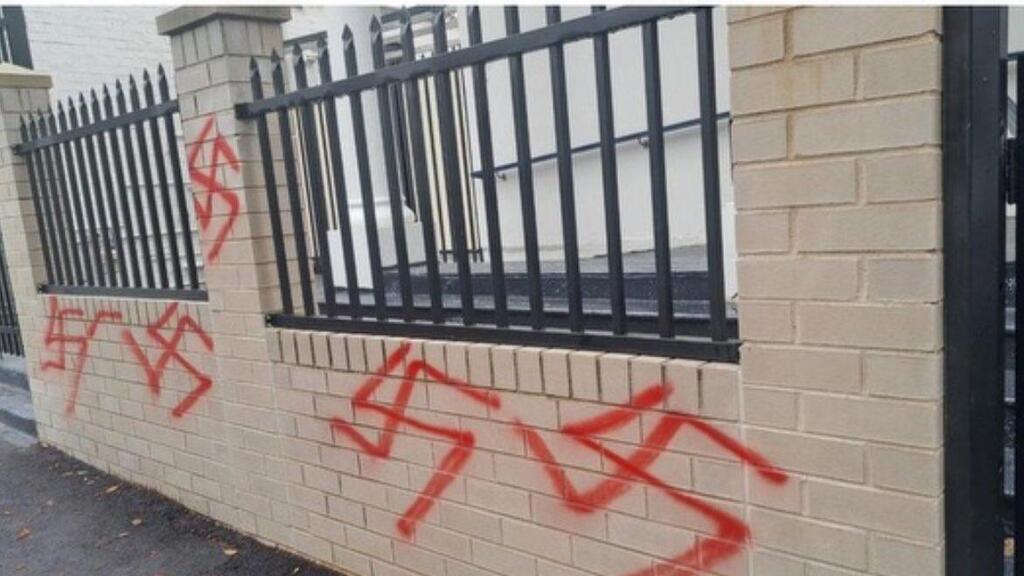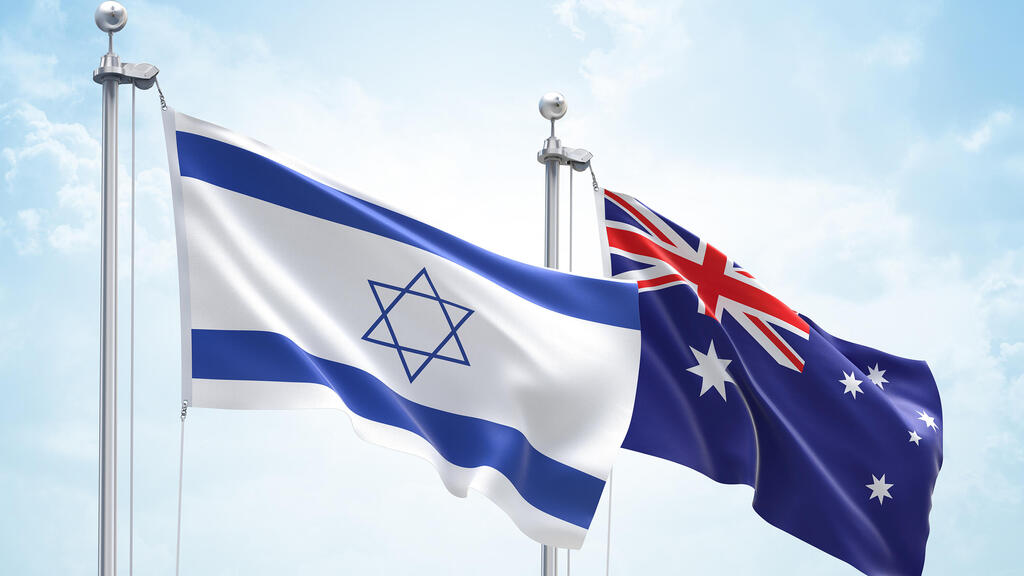Getting your Trinity Audio player ready...
In recent years, a small but growing number of Israelis have relocated to Australia, seeing it as an escape from Israel’s security and religious challenges and even from the bitter drama surrounding judicial reform. However, October 7 shattered the illusion of Australia as an island paradise insulated from the world’s problems.
Just two days after the massacre, on October 9, Jews were warned to stay home as an antisemitic mob gathered at Sydney’s iconic Opera House. Many heard chants of ‘Gas the Jews’. Astoundingly, nobody was charged, and the police later claimed the chant never occurred. Since then, things have only deteriorated.
Recent Israeli arrivals and longtime Jewish community members have been shocked as their children attending public schools were bullied because of their background. Those in Jewish schools are protected in fortresses and advised to conceal their uniforms at times.
4 View gallery


Antisemitic vandalism in Sydney
(Photo: From the X page of the Jewish Community in Australia)
A vehicle packed with explosives and containing the addresses of Jewish institutions, including a synagogue, was discovered. Police helicopters have patrolled Jewish neighbourhoods for weeks. Many fear it’s only a matter of time before lives are lost.
Last week, Jews in Australia faced new concerns when a video emerged of two Muslim nurses threatening to harm Jewish patients in hospitals.
Unlike in other countries, the current left-wing Australian government has offered little support to the Jewish community. Many ministers have a long record of anti-Israel activism, including the prime minister, who attended anti-Israel protests in his youth. Worse still, the government has become fixated on winning the votes of Australia’s rapidly growing Muslim population of one million, for whom Israel is the top politic
4 View gallery


Antisemitic grafitti and a car set on fire in Sydney
(Photo: AFP / AUSTRALIAN BROADCASTING CORPORATION )
The community is in shock because Australia has never experienced antisemitism at any significant level even compared to the U.S. or UK.
Aliyah is on many people’s mind and being discussed like never before.
There has always been a steady stream of Australian Jews who returned to the land of their forefathers, but it has never been much more than a couple of hundred people annually. Unlike olim from other countries, Australians have been motivated almost entirely by Zionism rather than by antisemitism.
That is changing.
Many have already purchased property in Israel or are planning to move.
This presents both an extraordinary opportunity and a challenge for Israel.
The Australian Jewish community is fiercely Zionist but deeply integrated into Australia society. Australian Jews are, on average, well-off financially and highly educated. They have a disproportionate impact in business and culture, with some of the country’s greatest generals, legal minds and business titans coming from a community that makes up less than half a percent of the population. Australian Jews have won the Nobel Prize, Olympic gold and numerous other honors.
Israel has done a remarkable job absorbing Jews fleeing distress. Millions of Jews from Iraq, Morocco, Ethiopia and the Soviet Union arrived at short notice and, after an often-messy start have become an integral part of the Jewish State. However, Israel has been less successful at attracting and retaining immigrants from the West.
Australian Jews share similarities with Jews in other Western countries but also have unique attributes. Many are eligible for European or other passports, meaning Israel must compete with other destinations. Australians who move to Israel often face culture shock. Accustomed to high standards of customer service, they take time to adjust to the forthright nature of Israeli society.
The sheer distance is another challenge. With no direct flights, the journey to Israel takes around 25 hours, making visits to elderly parents or family members difficult.
Arson at a synagogue in Melbourne
(ILTV)
Israel should prioritize recognizing Australian credentials and professional licenses to ease integration. Additionally, improving Hebrew fluency would be beneficial. Despite an enviable rate of Jewish day school attendance, Hebrew literacy remains low among Australian Jews. A small investment by Israel’s government could significantly improve outcomes for Australian olim.
Diaspora Affairs Minister Amichai Chikli is well regarded among Australian Jews, as are Ohad Tal and Sharren Haskel, who head the Israel-Australia Parliamentary Friendship Group. More frequent visits by Knesset members and ministers would be welcomed by the Australian Jewish community and help strengthen ties.
This wave of aliyah is not a foregone conclusion. Australia faces elections by May, and the opposition has been incredibly supportive of the Jewish community. Most believe a change in government would dramatically improve the situation for Australian Jews. Others, however, worry that the antisemitism genie cannot be put back in the bottle, pointing to rising antisemitism among younger generations. Some compare Australia’s climate to that of France during the Second Intifada when a surge in antisemitic violence convinced many Jews they had no long-term future there.
My organization is not throwing in the towel, we will continue to fight antisemitism and advocate for Israel, working with many millions of supportive Australians.
Regardless, if the current government is re-elected a wave of potentially thousands of Australian Jews may take the leap.
To Israelis, who are engaged in a seven-front war for survival, aliyah issues may seem secondary. Ignoring the potential would be a historic mistake. Australia would suffer from a Jewish exodus, but Israel should embrace this extraordinary opportunity.
Robert Gregory is the Chief Executive Officer of the Australian Jewish Association (AJA)






